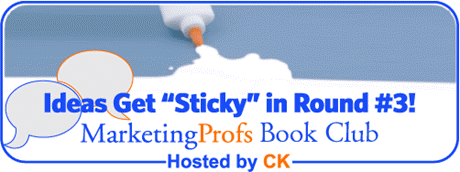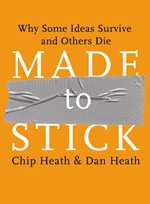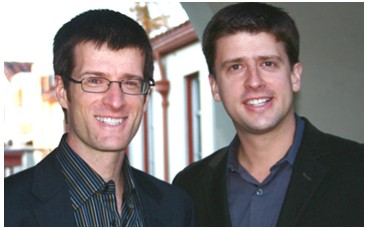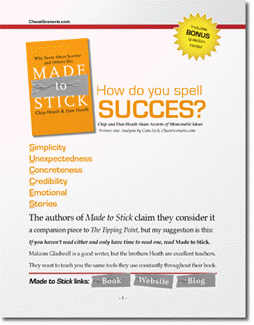
With spring comes not only a new season but a "sticky" new segment. Book Club is back for "Round Three" with the hottest book of the year. Those of you new to our Book Club... welcome aboard (learn all here and definitely sign up here). As for those returning for another round... welcome back.
 What's the book? None other than Made To Stick by Chip and Dan Heath. What's more? Instead of giving away 30 author-signed books, we're upping it to 50 free books. You want more? You'll receive a free bonus just for reading this article.
What's the book? None other than Made To Stick by Chip and Dan Heath. What's more? Instead of giving away 30 author-signed books, we're upping it to 50 free books. You want more? You'll receive a free bonus just for reading this article.
While Round 1 discussed " social media" and Round 2 focused on "branding," in Round 3 we're exploring "communications"—more to the point, we're learning how we marketers can do a far better job of making sure our brainy ideas stick. For good.
Made To Stick analyzes why some ideas survive while many others die. But that's not all; the authors have deconstructed why ideas that didn't have revenue incentives, like urban legends and fables, have amplified across social groups and through many generations... and then they developed a six-point "SUCCESs" system for how to get messages to stick. And stay that way.
Q&A With Chip and Dan Heath
 To kick off this segment, my colleague Cam Beck held a Q&A with Made to Stick's authors, here are the highlights:
To kick off this segment, my colleague Cam Beck held a Q&A with Made to Stick's authors, here are the highlights:
Q: For whom was the book written, and why?
A: All of us need to make our ideas stick from time to time. There are some people—teachers, ministers, politicians, and of course marketers—whose jobs depend on making ideas stick. Our book was written to help people make that happen. It's fiendishly difficult to take the light bulb that's in your head and recreate it in the minds of your audience. And that's where the traits of stickiness come in...to refine our most important ideas so that they'll endure.
Q: Why does your book use so many examples of advertising?
A: Advertising is a pure marketplace of ideas, so it's a great laboratory for studying stickiness. Great ad campaigns like Wendy's "Where's the Beef?" thrive on the principles of stickiness. Subway's Jared campaign, for instance, perfectly captures the power of a story to make an idea stick.
Q: What is the most important lesson from your book? What do you most hope "sticks" with marketers?
A: Use concrete, sensory language. Think of urban legends (the man who wakes up in an ice-filled bathtub without kidneys) or fables (Aesop's The Fox and the Grapes). These ideas etch themselves into our brains because of their sensory hooks. And this may sound like common sense, and yet it is not instinctive marketing behavior. You only need to visit a couple of Web sites to see the wasteland of bland abstractions: World-class customer service! Simplify your life! You can have it all!
Q: In your book, you make several references to "The Curse of Knowledge." How can knowledge be a curse... and how can it be overcome?
A: The Curse of Knowledge is the arch-villain in our book. The Curse of Knowledge says that once we know something, it becomes hard for us to imagine what it was like not to know it. And that, in turn, makes us communicate to others like speakers of a foreign language. We forget to translate.
Think of the IT guy in the office who can't give you a clear answer to something. He talks in jargon and abstractions that you can't follow. And we're all the IT guy in our areas of expertise—our knowledge complicates our communication. You can avoid the Curse of Knowledge by using the principles of stickiness. The power of a sticky idea is precisely that it crosses boundaries—boundaries of knowledge, experience, even culture.
Q: In your interview with U.S. News and World Report, you called PowerPoint presentations the "kryptonite of sticky ideas." What is the alternative?
A: When we're talking, or making presentations, we sprinkle in stories and anecdotes and specific examples. We treat them like garnish. And the bulk of our presentation consists of "high-level" talking points, which are almost always abstractions. PowerPoint feeds this tendency by giving us little easy-to-use bullets. And what do you put after a bullet? Certainly not a story. But stories and examples aren't garnish, they're the entrée. Most people communicate with, say, three parts exposition to one part story. That's exactly backwards. Don't let PowerPoint seduce you into meaninglessness.
Participation and Bonus
Sign up by Friday, May 18: To be eligible to receive one of the randomly selected author-signed books, you need to join the Book Club. If you signed up for the first or second segment, you're already in the database (so you need not sign up again; and, yes, you're eligible for a free book). Newcomers should hurry up and sign up, as I'll be emailing the free book recipients early next week; so you have until Friday, May 18, 5 pm PST, to join if you've not already.
 FREE Bonus: Cam Beck has conducted a thoughtful and thought-provoking eight-page analysis of Made To Stick's major themes—and you can download it absolutely free (pdf). While it's not a replacement for the read, it is a piece that emphasizes how we can make our improve our communications (ensure our ideas stick).
FREE Bonus: Cam Beck has conducted a thoughtful and thought-provoking eight-page analysis of Made To Stick's major themes—and you can download it absolutely free (pdf). While it's not a replacement for the read, it is a piece that emphasizes how we can make our improve our communications (ensure our ideas stick).
Group review for the book will start Tuesday, June 12, giving members four weeks to get the book read. I'll close with a few words from Chip and Dan Heath:
Our passion is ideas and what makes them stick, so the opportunity to join a group of idea connoisseurs in the marketing community to banter about ideas, via the MarketingProfs Book Club, well... it's going to be a heck of a good time! It's kind of like turning a group of physicists loose in a particle accelerator.
PS: I hope you get a free book, but even if you don't, please do still participate: At $16.47 for the hardcover, and $15.26 for the e-book, the book is a steal for all the knowledge it imparts (an audiobook is also available).
Disclaimer: Neither CK nor MarketingProfs is in any way retained by any author or publisher to promote any book or make any profit from the sale thereof.
Helpful Links
Have questions? Go here.
Want to join the Book Club? Go here.
Still have questions not addressed in our FAQs? email me at bookclub@marketingprofs.com.




